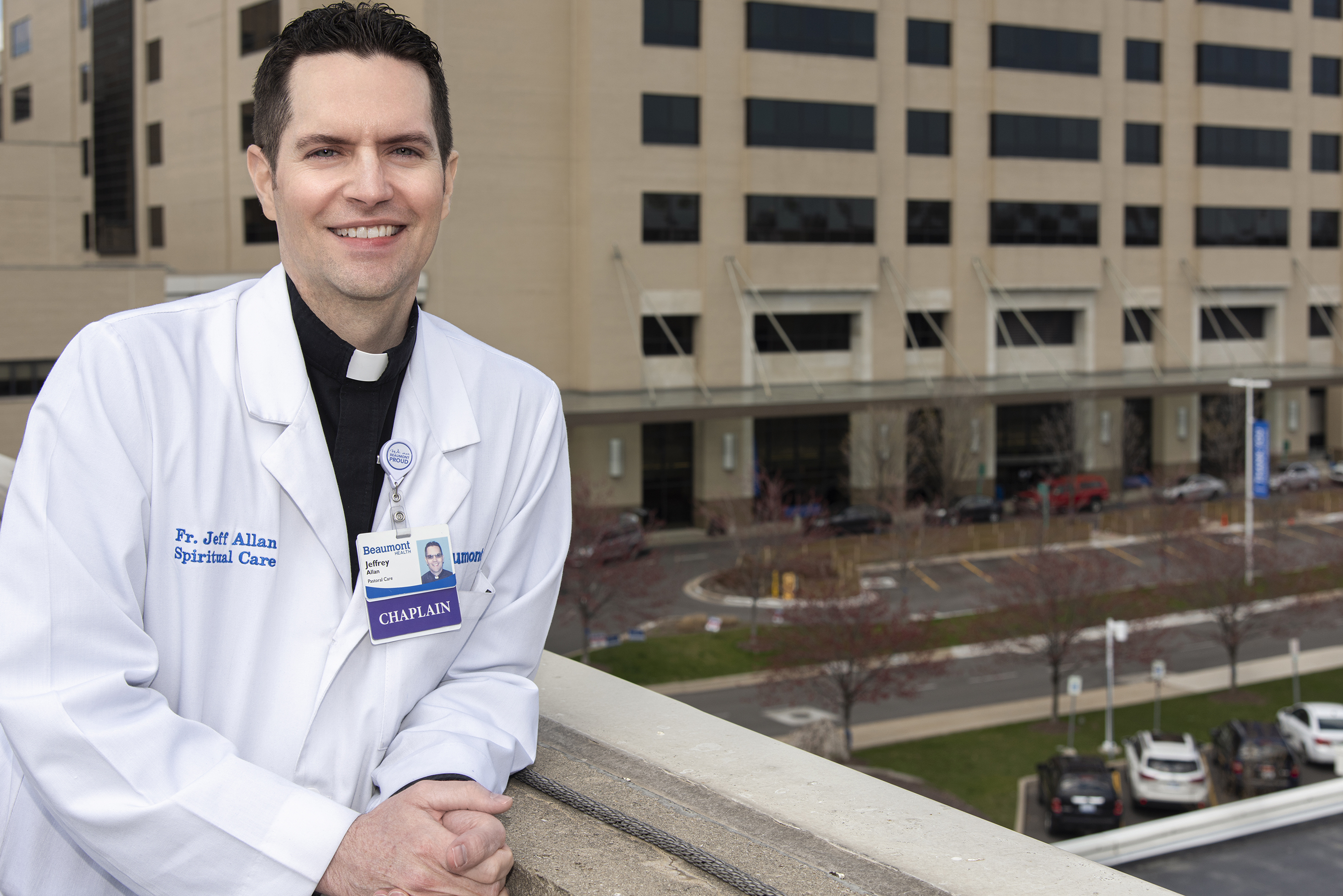As COVID-19 cases and deaths rise, chaplains are beacons of hope in a bleak situation: ‘People are beginning to realize ... God is in control’
ROYAL OAK — It’s a time of constant need.
The unending calls for visits, the long shifts in protective gear, the dozens upon dozens of people desperate for a comforting word while fighting a disease of which doctors have little understanding and even fewer means in fighting — it’s a battlefield mentality.
But that’s life right now for Fr. Jeff Allan, a chaplain resident serving with the spiritual care services team of Beaumont Health in Royal Oak.
If Pope Francis’ conception of the Church is one of a “field hospital,” Fr. Allan and clergy and lay chaplains across southeast Michigan are doing some of the hospital’s most essential work.
“Perhaps because of the gravity of the situation, people gravitate to people of faith, hope and above all, love,” Fr. Allan told Detroit Catholic. “That’s what chaplains offer. That's what our Catholic Church can offer. God can bring about a great good, no matter what happens.”
“People are scared; there is a lot of fear in the hearts of people,” Fr. Allan said. “People in the hospital are looking for Christ; they’re looking for hope.”
As Michigan grapples with the COVID-19 pandemic, with 36,641 cases in the state and 3,085 deaths as of April 24, hospital chaplain teams are comforting the ill, witnessing to the suffering, administering the sacraments where possible, and being a presence of Christ to those who badly need it.
“People are scared; there is a lot of fear in the hearts of people,” Fr. Allan said. “It’s not only the patients and families, but everyone is a little scared. People in the hospital are looking for Christ; they’re looking for hope.”
While outside clergy and visitors aren’t currently allowed, Beaumont, like most hospitals, is staffed with a diversity of qualified professional chaplains of many faiths. Like the doctors and nurses caring for patients, when Fr. Allan makes his rounds, he wears protective gear including an N95 mask, gown, face shield and gloves, and washes his hands regularly.
He still visits the rooms of non-COVID-19 patients, and for those infected with the coronavirus, he utilizes phone calls and “telechaplaincy” devices to stay in touch with patients and their loved ones reaching out for hope.
Adjusting to ministry during a pandemic
Hospital chaplains have necessarily adjusted how they minister during the pandemic, from reserving Communion for those who are dying to using phones, tablets and laptops to minister to those in need.
Chaplains must use extra precautions in order to limit the human-to-human spread of the virus in case any patient — or chaplain — is asymptomatic, said Fr. Luke Iwuji, chaplain at St. Mary Mercy Hospital in Livonia, part of the Trinity Health system.

“Before the coronavirus, I would see an average of about 20 to 25 people a day in person, but now, we reach out to patients through telephone, especially those who are suspected to have the coronavirus,” Fr. Iwuji said. “Overall, we take all the measures they have put in place, making sure we use masks and gowns. But the room visits have been cut drastically, so we rely more on telephones.”
Despite the fact that chaplains cannot physically visit those suffering from COVID-19, chaplains are using telemedicine to speak with patients and their families, pray the rosary with them and listen to their concerns.
When the sacraments aren’t possible, chaplains can offer spiritual advice — including how to pray an act of perfect contrition — to put patients’ minds at ease.
While chaplains are essential care workers, they’re also mindful of the shortage of personal protective equipment that is desperately needed on the front lines.
“When you pray with people over the phone, sometimes they are crying, but they are tears of gratitude,” Fr. Iwuji said. “It’s not been easy, but gradually, people are beginning to realize that this, too, will come to pass. God is in control.”
“We have to be very careful that every time a chaplain gowns up and uses a mask that it isn’t taking one from a bedside caregiver,” said Beverly Beltramo, director of spiritual care for Ascension Michigan, a Catholic health system that operates a half-dozen hospitals in Metro Detroit. “So we have to find other ways to be present and minster to people. But our chaplains are still in the hospital, available 24/7, as they have always been.”
Beltramo oversees an estimated 50 chaplains at Ascension Health System locations across the state from various denominations and backgrounds.
Each Ascension location has between one and five chaplains assigned, working eight-hour shifts five days a week and available on call, Beltramo said. Before the COVID-19 pandemic, a chaplain might see up to 10-20 patients a day, but those numbers have increased.
All chaplains have a graduate degree in theology or ministry and have completed 1,600 hours of internship and residency in clinical pastoral education, Beltramo said.
“Our chaplains meet people where they are spiritually,” Beltramo said. “If I’m a (Catholic) chaplain, I might be with a family that is Jewish or a family that is Buddhist or Baptist or maybe a family that maybe believes in God but isn’t too sure.”
For Fr. Iwuji, bringing hope and consolation to people in their hour of need is paramount to what it means to be a priest.

“This is one of the things you think about in your calling as a priest, that God is calling you to be here for all these people,” Fr. Iwuji said. “It’s probably not how you expected you would serve, but you know you have been called in such a way to help these people.
“When you pray with them over the phone, sometimes they are crying, but they are tears of gratitude,” Fr. Iwuji added. “They understand you can’t expose yourself to someone who is (COVID-positive) or under suspicion. It’s not been easy, but gradually, people are beginning to realize that this, too, will come to pass. God is in control.”
A listening ear for patients, families and staff
Catholic priests, rabbis, imams, other ordained clergy and professional lay ministers serving as hospital chaplains are part-time or full-time staffers deemed essential care workers.
Regardless of religious faith, chaplains are listening posts, praying with people and letting them know of the love of God.
But spiritual care isn’t just provided for patients and their families. As doctors, nurses, health care teams and support staff spend long hours — sometimes entire 24-hour periods — away from their families confronting the daily ravages of the pandemic, chaplains are alongside them providing much-needed support.
“There is a lot of relationship-building that goes on around the hospital,” Fr. Allan said. “As a chaplain, you get to know people and you see a lot of familiar faces.”
The pressures of hospital life can take a physical, spiritual and emotional toll on those caring for a larger-than-usual number of patients, Fr. Allan said.
“As a chaplain, you build rapport with these people who are seeing these cases over and over again,” Fr. Allan said. “Many of them really want to talk, to express their feelings, their fears, their hopes, especially many who have a faith rooted in Christ.”

In addition to phone calls to patients and families, Beltramo said Ascension is using telemedicine to offer spiritual care to everyone, including staff.
“Every day at noon, we have a Zoom hangout with people across Ascension — not just chaplains — coming together to pray the rosary across all our sites,” Beltramo said. “For the pope’s (extordinary urbi et orbi) blessing, we came together, and people dialed in to pray together.”
Beltramo added Ascension makes Masses celebrated in the chapel available on closed-circuit television, as well as regular devotions such as the Lord’s prayer, so patients can watch in their rooms.
“I think it makes a difference to people, knowing that Mass is being said in the building for them,” Beltramo said.
Mass is also still celebrated in Beaumont’s spiritual care center, with a broadcast playing on a closed-circuit channel on the hospital television station, Fr. Allan said. In addition to Mass, Beaumont’s chaplains lead a weekly nondenominational Christian service, Jewish service and meditation service, and prayer sessions are held with hospital workers. Beaumont Royal Oak also is also launching a 24/7 “Spirit of Hope” inspiration program on the closed-circuit channel, 52.7, to encourage all who tune in.
As the situation, protocols and procedures evolve, so does the ministry. But one thing remains the same: people are still looking for hope, and chaplains are right there to provide it.
“The storm is unclear, and we don’t know when it will be over,” Fr. Allan said. “But when you look at what hospitals are doing and what the Church is offering online — the spiritual retreats, Masses, the different prayers and things families can do through electronic means — people are grateful to have that and are grateful we are here.
“There is always a light of hope, even when it seems dark.”










